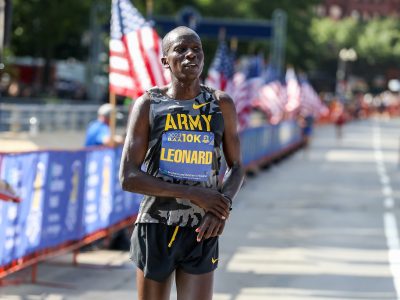Bad News for Leonard Korir: World Athletics Adds 11 Universality Places in 2024 Olympic Marathon
Korir is currently #84 on the Olympic marathon list and needs four men ahead of him to be removed to get to Paris
By Jonathan GaultUS Olympic Marathon Trials third-placer Leonard Korir‘s 2024 Olympic chances took a major hit as World Athletics added 11 universality athletes to the Olympic marathon field today. The news does not affect Trials winner Conner Mantz or Trials runner-up Clayton Young, both of whom had already qualified by running under the 2:08:10 automatic qualifying standard. The last time the US failed to qualify the maximum of three athletes for the men’s Olympic marathon was at the 2000 Games in Sydney.
World Athletics also awarded nine universality places in the women’s Olympic marathon field, but that will not affect the American women, who will still send a full team of three. The top three finishers at the US Olympic Trials — Fiona O’Keeffe, Emily Sisson, and Dakotah Lindwurm — all ran under the 2:26:50 auto standard within the qualifying window (November 6, 2022 – May 5, 2024).
Because Korir did not hit the auto standard — his best time during the qualifying window was 2:09:31 — it meant he would have to wait to see if the United States earned a third place in the Olympic field via world ranking.
When the qualifying window closed on Sunday, Korir’s chances looked very good. The #3 American on the Road to Paris list, CJ Albertson, was ranked 73rd, with the top 80 men earning spots in the Olympics. Since Albertson’s spot would pass to Korir via World Athletics’ new quota reallocation rule, Korir appeared a strong bet to make it to Paris.
However, there was one final hurdle to clear. Any country that does not have an athlete qualified in any track & field event (and each sex is viewed separately) is able to enter their best-ranked athlete in either the 100 meters, 800 meters, or marathon. Those spots — known as universality places — are added to the field before athletes qualifying via world ranking. (LetsRun.com wrote about this in more detail back in January).
The Olympic field size is supposed to be capped at 80 athletes and according to World Athletics’ Olympic qualification document, any athletes qualified via universality place also count towards that number.
Considering only one man entered the 2020 Olympic marathon via universality place, many — including LetsRun.com — assumed Korir would be safe for Paris. But World Athletics ultimately awarded 11 universality places, which bumped Albertson down to #84 on the Road to Paris list.
The Olympic field can only be expanded beyond 80 to account for automatic qualifiers or universality places. As it stands now, the projected women’s field has 97 athletes (88 via standard and 9 via universality) while the men’s field has 81 (70 via standard and 11 via universality).
When World Athletics announced the Olympic qualifying system in December 2022, its aim was for 50% of qualifiers to come via entry standard and 50% via world ranking. As things stand, no athletes in either the men’s or women’s marathon will qualify via world ranking.
Below, a few FAQs about the situation.
Is there any way Korir could compete in Paris?
Korir’s chances of running at the Olympics this year took a significant hit on Wednesday, but his coach Scott Simmons has not given up on the possibility.
One way Korir could compete is if three federations turn down their spots in the Olympic marathon field. This is a long shot, however, and would most likely require a series of injuries to athletes from countries without a qualified replacement.
(Update: Federations will have between May 9-11 to decline any quota places in the Olympic marathon. The final Road to Paris list with all athletes eligible for the Olympic marathon will be published on May 12.)
Simmons also told LetsRun.com that he has sent an email to USOPC Athlete Ombudsman Kacie Wallace and key officials at USATF regarding Korir’s situation. Simmons noted that the qualification window for other track & field events does not close until June 30 so it is premature to rule on which federations will not have any qualified athletes.
For example, Cyprus was granted a universality place in the marathon even though Cyprus has a highly-ranked 110-meter hurdler Milan Trajkovic who looks likely to qualify (Trajkovic is ranked 20th on the Road to Paris list, with 40 men qualifying in the 110 hurdles). Uruguay was also granted a universality place even though long jumper Emilano Lasa is currently ranked 21st on the Road to Paris list (with 32 athletes qualifying in the long jump).
In addition, Simmons pointed out that federations must submit proof of the “technical level and international participation of the nominated athlete.” One of the universality athletes failed to break 2:20 during the qualification window (Jordan’s Moath Alkhawaldeh) while another has never run a marathon (Sudan’s Yaseen Abdalla, who has a 13:33 5,000m pb).
USATF spokesperson Aarti Parekh told LetsRun.com USATF is still working to get answers and will share them once more information is available.
How did this happen?
Most observers were surprised to see 11 universality places awarded in the marathon. In 2016, there were only four universality places awarded in the men’s marathon, and in 2020, it was just one. Why was the numbers so high in 2024?
The reason is because World Athletics changed its rules for universality places for the 2024 Olympics. Previously, universality places could be awarded in any event except the steeplechase, 10,000m, or decathlon. But for 2024, World Athletics said the places could only be awarded in the 100m, 800m, or marathon, and it set a limit of three total universality places in the 800m, meaning most of the spots had to be used in the 100m or marathon. The problem for athletes on the bubble like Korir is that no one knew how many spots were going to be awarded until Wednesday.
Korir, a 2016 Olympian in the 10,000 meters, did what he could to try to qualify this spring, running the Rotterdam Marathon on April 14 just 10 weeks after the Trials to take a shot at the 2:08:10 auto standard. Korir came up short in that race, running 2:12:47.
Who qualified via universality places?
With 11 universality places out of 80 total spots, 14% of the 2024 Olympic marathon field will consist of universality athletes as things stand. The universality places ranged from North Macedonia’s Dario Ivanovski, who missed the auto standard by just 16 seconds in Seville in February, to Sudan’s Yaseen Abdalla. The 22-year-old Abdalla, who competes in the NCAA for the University of Tennessee, has never raced beyond 10,000 meters.
Why, then, was Abdalla granted a universality place?Tennessee assistant coach Nic Jacobsen told LetsRun.com that Sudan likely submitted Abdalla’s name because his 5,000-meter world ranking makes him Sudan’s top-ranked athlete in any event and that it made more sense to submit his name in the marathon than the 100m or 800m.
Here is a look at which athletes were awarded universality places, along with their best marathon performances during the qualification window.
| Athlete | Country | Best marathon during Q window |
| Dario Ivanovski | North Macedonia | 2:08:26 (2024 Seville) |
| Il Ryong Han | North Korea | 2:09:42 (2024 Wuxi) |
| Amine Khadiri | Cyprus | 2:10:20 (2023 Seville) |
| Samuel Freire | Cabo Verde | 2:11:01 (2024 Seville) |
| Cristhian Zamora | Uruguay | 2:11:02 (2023 Seville) |
| Jordan Gusman | Malta | 2:13:13 (2023 Chicago) |
| Ilya Tyapkin | Kyrgyzstan | 2:17:05 (2024 Hannover) |
| Eduardo Terrance Garcia | Virgin Islands | 2:17:09 (2023 McKirdy Micro) |
| Valentin Betoudji | Chad | 2:18:20 (2023 Valencia) |
| Moath Alkhawaldeh | Jordan | 2:21:17 (2023 Berlin) |
| Yaseen Abdalla | Sudan | None |
Here is how many athletes each country qualified for the Olympics
Korir is in his current predicament because only two American men ran under the 2:08:10 auto standard between November 6, 2022, and May 5, 2024. Fourteen countries had at least three men run under the time within the window, but the US was not among them. With the qualification window now closed, here’s a look at every country with at least two automatic qualifiers in the marathon. A reminder that countries can only enter a maximum of three athletes at the Games.
72 – Kenya
62 – Ethiopia
27 – Japan
13 – Eritrea
8 – Morocco
6 – France
5 – Uganda, Spain, Italy, Israel
4 – Germany, China
3 – Belgium, Great Britain
2 – USA, Canada, Australia, Switzerland, Netherlands, Norway, Tanzania
Conclusion by LRC’s Robert Johnson
The more I analyze this, the more I conclude it’s not looking good for Korir. Simmons’ argument that granting a universality place to Cyprus and Uruguay even though they have two athletes likely to qualify in other events makes some sense. But even if they are removed, that would only move Albertson/Korir up to #82 — he’d need to move up two more spots.
And that being said, I can also understand why WA might want to officially declare the marathon field now instead of waiting until the end of the qualifying window for other events (June 30). Picking the Olympic marathon team on June 30 seems unfair to the marathoners. Do you really want to give a marathoner just six weeks to get ready for the Olympics? If they want to run well, they want to start training now and making them train now only to pull the rug out from under them at the end of June would strike some as cruel.
I also don’t have a problem with Yaseen Abdalla being added to the field without having run a marathon. He has run pbs of 7:42/13:33/28:33 at shorter distances. It’s not like he’s some scrub who is going to embarrass himself.
Korir could always hope for a couple of pullouts from qualified athletes or doping positives, but the problem with that idea is that due to the quota re-allocation system, the countries could just replace the injured athlete with someone else who has run under 2:11:30 (personally, I believe the quote reallocation system should only apply to countries that hold a trials race).
One other tricky situation involves Bahrain’s Marius Kimutai. Kimutai ran an Olympic qualifying standard of 2:05:06 at the Barcelona Marathon in March 2023, which cemented his spot when the first batch of 64 qualifiers was finalized on January 30. But Kimutai then tested positive for EPO in an out-of-competition test on February 2, 2024, and accepted a three-year ban which took effect on March 28 2024. It is not clear if Kimutai will be removed from the the Road to Paris list entirely or if Bahrain will be able to reallocate his place with someone like Abdi Ali Gelelchu, who has a 2:08:22 pb, and won Copenhagen last weekend in 2:09:12.
If Kimutai is removed and Uruguay and Cyprus don’t end up getting universality spots, Korir would still need one more withdrawal as he/Albertson would then be #81 on the Road to Paris list.
Talk about Korir’s Olympic chances on our world-famous fan forum / messageboard.
MB: BREAKING: Leonard Korir not going to Paris! 11 Universality athletes get in ahead of him!








